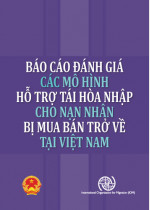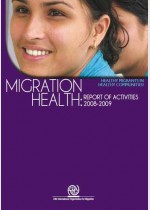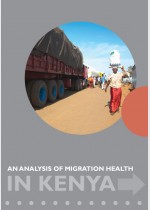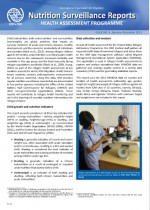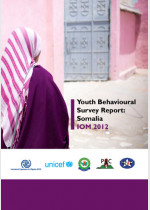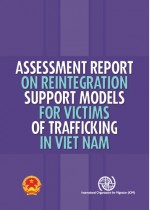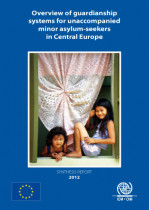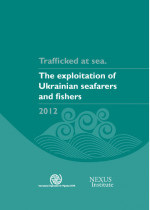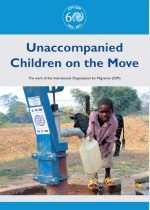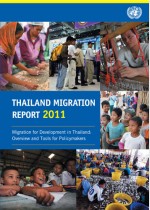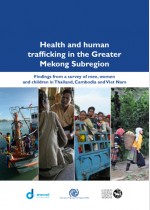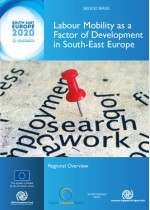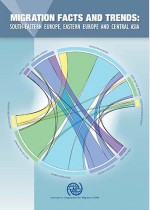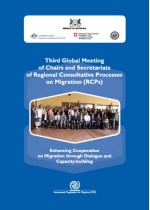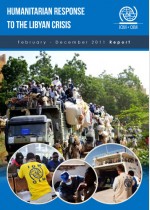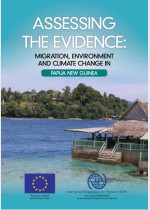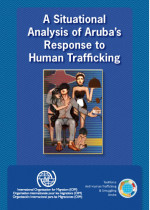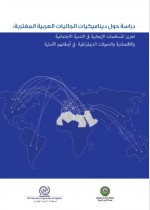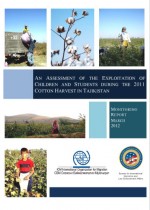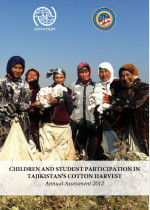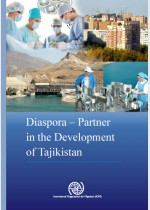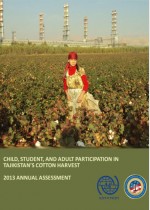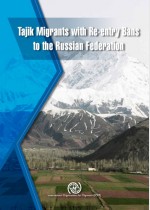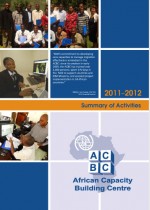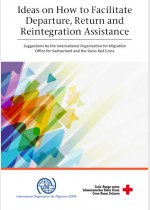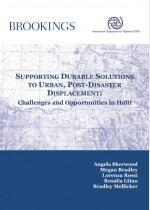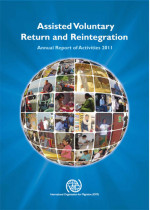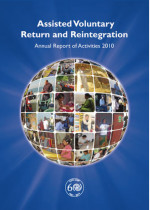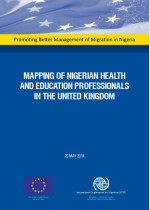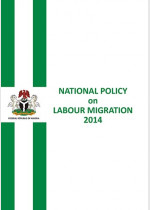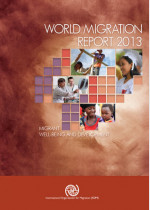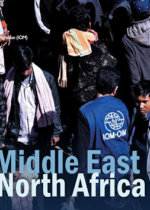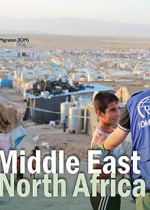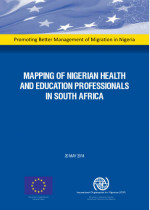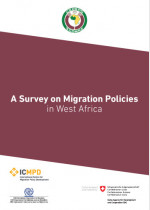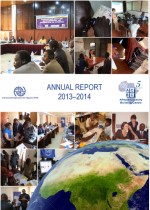Rechercher des livres
Displaying 3351 - 3396 of 3396
Despite considerable efforts by governments, civil society, and communities to prevent and reduce trafficking, the trade continues, and is reportedly worsening in some areas. Trafficked persons are often subject to abuse such as rape, torture, debt bondage, unlawful confinement, and threats… Read More
This report illustrates the multidimensional activities carried out by the Migration Health Division throughout the world in 2008-2009. Key achievements in three main programmatic areas are presented: Migration Health Assessments and Travel Health Assistance; Health Promotion and Assistance for… Read More
This report was commissioned by the Kenyan Ministry of Public Health and Sanitation and IOM. It provides a concise overview of migration health in Kenya, reinforcing that migration is a social determinant of health. This report analyses specific health concerns in Kenya such as TB and… Read More
This report presents child growth and malnutrition status of refugee children examined by the IOM Health Assessment Programme at select locations namely Ethiopia, Iraq, Jordan, Kenya, Malaysia, Nepal, Thailand, Rwanda, South Africa and Uganda. The report analyses prevalence of three key indicators… Read More
Supported by the Global Fund, The International Organization for Migration (IOM) implemented community-based and youth-focused HIV prevention programs in Somalia. Little was known about the HIV vulnerability of Somali youth aged 15-24, and a baseline study was conducted on the sexual behaviors,… Read More
Despite considerable efforts by governments, civil society, and communities to prevent and reduce trafficking, the trade continues, and is reportedly worsening in some areas. Trafficked persons are often subject to abuse such as rape, torture, debt bondage, unlawful confinement, and threats… Read More
Designed as a Synthesis Report, the “Overview of guardianship systems for unaccompanied minor asylum-seekers in Central Europe” publication is part of the “Improving the Quality of Unaccompanied Minor Asylum Seekers’ Guardianship and Care in Central European Countries” project that was carried out… Read More
This NEXUS Institute-authored study explores the issue of trafficking at sea through the experiences of 46 Ukrainian seafarers and fishers trafficked to Russia, Turkey and South Korea, on vessels under flags from Panama and Russia. Through a discussion and exploration of their specific trafficking… Read More
Children and youth migrating – whether between or within countries and whether accompanied by their relatives or not – have become a recognized part of today’s global and mixed migration flows. Nevertheless, in research and policy debates, the migration of children and youth is considered a new… Read More
The report provides an update of migration statistics, policies and legislation in Thailand and explores the link between migration and development.
Trafficking in human beings is a gross violation of human rights that often involves extreme exploitation and abuse. To date, there has been very limited robust research on the health consequences of human trafficking, particularly for various forms of labour in the Greater Mekong Subregion. This… Read More
The report presents the main areas of intervention, activities and results of the IOM Office in Romania in 2013. The first two chapters introduce IOM and its Office in Romania, emphasizing both the worldwide nature of the Organization's mission and the main areas of intervention in Romania.… Read More
Cross-border labour mobility can contribute to the improved matching of skills and jobs, transfer of knowledge and technology, increased economic productivity and employment creation. While the current economic situation and limited employment opportunities in South-East Europe pose considerable… Read More
Migration Facts and Trends: South-Eastern Europe, Eastern Europe and Central Asia presents an overview of the migratory situation in South-Eastern Europe, Eastern Europe and Central Asia (SEEECA). This region consists of 20 countries and territories covered by the IOM Regional Office in Vienna:… Read More
Regional Consultative Processes on Migration (RCPs) are important mechanisms that foster inter-State cooperation and partnership on migration issues by bringing States together for informal, non-binding dialogue at the regional level. RCPs carry out a number of functions, including information… Read More
The “IOM MENA 10-month report” looks into IOM’s engagement in assisting migrants and displaced population since the start of the Libyan crisis to the end of 2011. Firstly, it provides an insight into Libya, reporting on the activities, operations and challenges faced in gaining access to the… Read More
The training course, “Enhancing Capacities of Policymakers and Practitioners on Migration, Environment and Climate Change in Sub-Saharan Africa”, was held in Moshi, United Republic of Tanzania, from 11 to 13 March 2014. This training built upon the success of previous migration and environment… Read More
In recognition of the increasing significance of the migration, environment and climate change nexus, the IOM 105th Council Session, convened on 25 to 27 November 2014, included a special focus on the complex linkages between climate, environment and human mobility. Several high-level events… Read More
In the framework of the European Union–funded Migration, Environment and Climate Change: Evidence for Policy (MECLEP) project, this national assessment brings together existing evidence on the migration, environment and climate change nexus in Papua New Guinea (PNG).
This publication, “A Situational Analysis of Aruba’s Response to Human Trafficking,” serves as a discussion and action guide for all those involved to improve Aruba’s response to the crime. It results from a desire among key stakeholders to better understand and assess actions against this… Read More
This collection of research papers focuses on specific aspects of the complex relationships that exist between expatriate communities and their home countries in the Middle East and North Africa, highlighting in particular the various kinds of social, political, and economic engagement that define… Read More
Combating human trafficking is a key priority for the International Organization for Migration (IOM). Trafficking in persons primarily involves exploitation, and as such, the use of child labour during the cotton harvest falls within the scope of IOM activities. As an intergovernmental body, IOM in… Read More
A product of the ongoing ‘Monitoring of Children and Students in the Cotton Fields in Tajikistan’ project conducted by International Organization for Migration (IOM) and sponsored by the United States Department of State’s Bureau for International Narcotics and Law Enforcement Affairs (INL), this… Read More
This publication is the English-translated version of the study titled “Диаспора – партнер по развитию Таджикистана” published in 2014. The study, funded by the International Organization for Migration (IOM) Development Fund under the project “Ey Vatan Mesozamat!” (Engaging Tajik Diaspora in… Read More
Produced within the framework of the Migration Profile Development Project for the Philippines, the Country Migration Report: The Philippines (CMR) provides a comprehensive evidence-based account of the country’s migration experience in a single, concise document to serve as a tool for… Read More
Combating human trafficking remains one of the central priorities of the International Organization for Migration (IOM). Global IOM data on direct assistance show that more than half of all victims of trafficking have been exploited for the purposes of forced labour, and forced labour continues to… Read More
This exploratory study, conducted in 2013, examines the challenges and future plans of the growing number of Tajik migrant workers banned from re-entering the Russian Federation. Varying in duration from three to five years, these re-entry bans have led to a growing category of involuntary… Read More
This publication summarizes activities of the African Capacity Building Centre (ACBC) in 2012–2013. Established in 2009 at the request of IOM’s African Member States, the ACBC activities fall under three distinct but inter-related pillars. First, the ACBC provides technical expertise in… Read More
This publication summarizes activities of the African Capacity Building Centre (ACBC) in 2011–2012. Established in 2009, the ACBC avails technical expertise in migration and border management, based on requests from African Member States. In 2011–2012, assessments, trainings, workshops and research… Read More
The recent global economic crisis has highlighted the resilience of migration and further confirmed that human mobility forms an integral part of our globalized world. Migration is one of the ways in which the exchange of talent, services, skills and a diversity of experience is achieved. Yet… Read More
Super Typhoon Haiyan (Yolanda), was one of the strongest tropical cyclones in history, and made landfall in the Philippines in early November 2013, with winds exceeding 300 km/h and a 5-m storm surge. Over 4 million people were displaced, with damage to housing and infrastructure across a vast area… Read More
For 20 years, the International Organization for Migration (IOM) has been providing voluntary return and reintegration assistance in Switzerland. Globally, IOM assists the voluntary return of about 30,000 people in more than 160 countries every year.
The earthquake that struck Haiti on 12 January 2010 sparked a massive displacement crisis in Port-au-Prince and the surrounding metropolitan area, home to an estimated 2.8 million residents at the time. At the peak of the crisis, over 1,500 camps sheltering 1.5 million internally displaced… Read More
The Assisted Voluntary Return and Reintegration 2011 Annual Report outlines IOM’s work carried out during 2011 in the areas of ‘Assisted Voluntary Return and Reintegration’ (AVRR) and `Post-Arrival and Reintegration Assistance` (PARA) exclusively implemented in countries of origin to assist… Read More
The Assisted Voluntary Return and Reintegration 2010 Annual Report outlines IOM’s work implemented during 2010 in the areas of ‘Assisted Voluntary Return and Reintegration’ (AVRR) and `Post-Arrival and Reintegration Assistance` (PARA) exclusively implemented in countries of origin to assist… Read More
Nigerian diaspora members currently living in the United Kingdom are highly skilled and knowledgeable, and thus can contribute to national development. They can make contributions in the form of investment, skills transfer, mentoring and consulting.
This mapping exercise was conducted to provide… Read More
The protection of Nigerian migrant workers abroad has become necessary because of their vulnerability to discrimination, extortion, arbitrary detention, hazardous working conditions, deportation, rape, violence and even murder.
In 2013, a second High-level Dialogue on International Migration and Development (HLD) will be held, presenting the international community with a critical opportunity to focus its attention on how to make migration work for development and poverty reduction. The HLD takes place at an important… Read More
In a region that has seen major population movements in the past decade, 2011 stands out not only for the migration dynamics that have flowed into, out of, and within the Middle East and North Africa region, but also for the unprecedented social movements that have transformed the political… Read More
One year on from the Arab uprisings, the historic events of 2012 look no less extraordinary by comparison. New governments took office after landmark sets of elections in Egypt, Tunisia, and Libya but often struggled with the difficult political and economic challenges they faced whilst… Read More
In 2013, migration in the Middle East and North Africa took place against the background of numerous acute and protracted crises, political transitions, demographic disparities, and uneven labour supply and demand. Migration flows in the region are complex in nature and often result in… Read More
The trend of Nigerians migrating to South Africa has been increasing over time and indications are that this is still continuing. The increasing migration trend has created an opportunity to harness the potential resources of this group. This mapping exercise was conducted to provide… Read More
In 2014, significant flows of migration to, through and from the Middle East and North Africa continued unabated. Ongoing conflict, economic stagnation, and political turmoil were main drivers of migration, though motives for movement remain complex. Irregular migration especially for… Read More
In West Africa, the large majority of people move in the region. Now this South–South migration is seven times greater than migration flows from West African countries to other parts of the world. Côte d’Ivoire, Ghana and Nigeria have become important countries of destination hosting large… Read More
The IOM African Capacity building Centre Annual Report is the main repository and record of the Centre’s work during a one year period. It covers the activity undertaken by the ACBC in close coordination with IOM country and Regional offices and as an interlocutor on Capacity building … Read More
This study, by Altai Consulting for IOM’s Regional Office for the Middle East and North Africa (MENA), creates a fresh and updated understanding of the dynamics of migration flows across the Mediterranean. Fieldwork was conducted between November 2014 and February 2015 across seven countries… Read More
Pagination
- Première page
- Page précédente
- …
- 60
- 61
- 62
- 63
- 64
- 65
- 66
- 67
- 68
